Antarctic sanctuary: The Weddell Sea quest
Description
For centuries, mankind has been hooked on the concept of a mysterious continent at the end of the world. Ancient Greeks and Romans called it "the unknown southern land" and a century ago, Captain Robert Falcon Scott paid the ultimate price on his famous South Pole expedition.
Antarctica, the planet's southernmost continent, is home to spectacular biodiversity - from emperor penguins and blue whales to krill. But climate change, plastic pollution, oil drilling and an ever-expanding commercial fishing industry are threatening this undisturbed land and its iconic creatures.
Now a bid is under way to create a massive Antarctic Ocean sanctuary in the vast and remote Weddell Sea. The marine reserve would cover 1.8 million square kilometres and would be protected from direct human impacts like fishing, oil drilling and deep-sea mining.
"The sanctuary will be about five times the size of Germany. The proposal is already on the table and has already got the backing of the EU," says Will McCallum, head of oceans at Greenpeace UK, who leads the Weddell Sea petition - one of the most significant campaigns in the environmental organisation's history.
READ: The Weddell Sea proposal: Petition to create world's largest protected area
"Scientists are saying we need to protect a third of the world's oceans, at least. If we want to let fish stocks recover, if we want to mitigate against the worst impacts of climate change, then Antarctica is a great place to start," he adds.
Formulated by Germany and backed by the EU, the Weddell Sea proposal aims at creating a haven for Antarctica's wildlife and preventing the spread of the devastating effects of climate change, overfishing and pollution.
Paul Ruzycki, captain of the Greenpeace icebreaker Arctic Sunrise, explains why he joined the expedition, one that could face real dangers in treacherous waters.
"I am here for the same reason as the other people: for the cause ... Getting people to realise why they should care about the Antarctic ... this is wildlife that people have never come across, or will never come across," says McCallum.
"Being able to tell that story relies on us getting there and relies on us getting that footage back, to talk about the importance of marine sanctuaries. Climate change will not be ... as bad if we make parts of the ocean off-limits."
earthrise joins Greenpeace's expedition to the Weddell Sea, as a team of scientists, ocean photographers and ocean experts sets out to gather sufficient evidence to ensure that the proposal is carried through and that international support is garnered.
- Subscribe to our channel: http://aje.io/AJSubscribe
- Follow us on Twitter: https://twitter.com/AJEnglish
- Find us on Facebook: https://www.facebook.com/aljazeera
- Check our website: https://www.aljazeera.com/
More Episodes
Bangladesh has one of the largest number of solar home systems in the world, reaching over 20 million people. Thirty percent of the electricity these generate is wasted each year, while over six million people in the country have no access to power.
A dynamic startup called SolShare has...
Published 06/12/21
Being in tune with nature used to be instinctive for all humans. It was a matter of survival. But over the centuries, as we urbanised and industrialised, the connection has become weaker.
But Indigenous communities around the world have not forgotten what it means to live in harmony with Earth....
Published 05/19/21
As populations grow and incomes rise, we are eating more and more meat and dairy. Intensive livestock farming, however, requires huge amounts of resources and is highly polluting. Yet, animal protein is essential to the 1.3 billion people who depend on livestock to survive.
So, what is the...
Published 05/12/21


